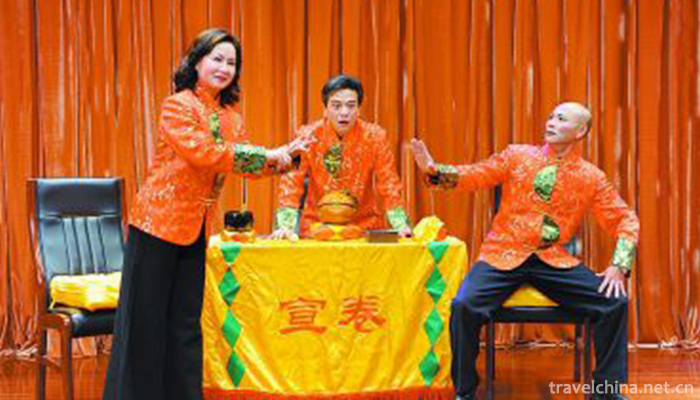Pudong Publicity Book
Nanhui Xuanjuan is an ancient traditional art of rap and singing. Xuanjuan originated from "vulgar speaking" in Tang Dynasty and "Tanjing" in Song Dynasty. It is a term used by Buddhists and their followers to preach "Baojuan", which later evolved into folk art. Xuanjuan, also known as "Nian Xuanjuan", first appeared in the temple fair of social drama, then entered the Tea House Hotel and the rural living room. In the countryside, there is a custom of "reading Xuanjuan" from spring tillage to autumn harvest. At the end of the nineteenth century, Suzhou Xuanjuan spread to Zhoupu, Nanhui Xuanjuan spread to Shanghai. Qingpu, Songjiang, Jiading and other Shanghai suburbs were introduced from Kunshan in the late Qing Dynasty and early Republic of China. Therefore, Nanhui Xuanjuan, also known as Pudong Xuanjuan, was the earliest one in Shanghai.
origin
The earliest form of publicity performance is single-file, one person sings while turning the publicity roll while hitting wooden fish. After the formation of double gear, that is, a bell. Nanhui's roll is in four stalls, the left side of the desk is for the master, and the actor is playing "Lao Lang" (sandalwood board); behind the master, she sits down and plays female actors (ladies, girls, etc.) as well as big and small wooden fish; in front of the right, she pulls Erhu, sings dragon tunes, and plays the roles of "Running Dragon Set" (hiring, duty, etc.); in the back of the right, she knocks "hitter" (hitting bells), and plays backhorns and heels. Sing and drag. "Four stalls" roll-out actors are shrewd, with clear roles and strong artistic appeal.
Xuanjuan has rich bibliographies and long stories, such as Shuangzhufeng, He Wenxiu and Xiaodeng Ji. Its short stories are very distinctive, such as "Flower Names in December" and "Flower Names in December" and so on.
Present situation
Nanhui Xuanjuan has always been closely linked with current affairs and politics, such as holding special singing performances to celebrate the victory of the Anti-Japanese War in the period of the Anti-Japanese War, publicizing the Marriage Law "Daughter-in-law sighs" after the founding of the People's Republic of China, and "Family Running for Riches" during the period of reform and opening up. Up to now, the Xuanjuan is still a popular traditional folk music art in Zhoupu, Hengwu, and Watt

0 Questions
Ask a Question
Your email address will not be published.